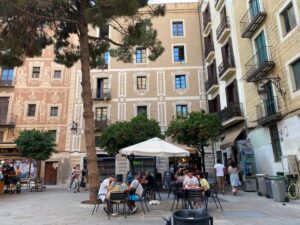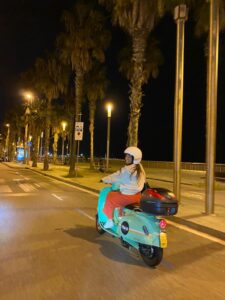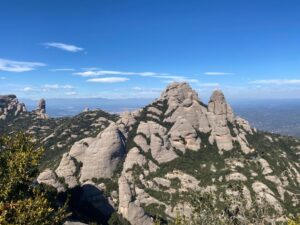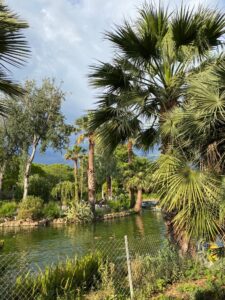Kategorie: ‘Business Administration and Engineering’
Highly recommendable internship in Liechtenstein
- Business Administration and Engineering: Mechanical Engineering M.Sc.
- Liechtenstein, Schaan
- Hilti AG
- 10/2022 – 03/2023
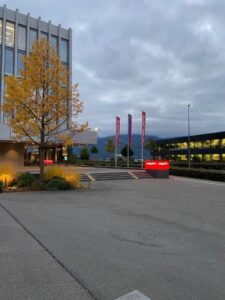
© Phil Brune
Hilti AG is a multinational company that specializes in manufacturing and supplying construction tools, systems, and services. It is committed to sustainability and social responsibility and is known for its high-quality products and innovation in the industry.
Preparation:
After I received my acceptance for the internship in Liechtenstein, I immediately started looking for an apartment. Immediately it became clear that it is not allowed to live in the country itself. So, you must decide whether you want to live in Switzerland or in Austria near the border to Liechtenstein. Clear recommendation: Feldkirch in Austria. Pretty much all interns live there, and it is a very nice old town.
Unfortunately, I was quite unlucky with my first apartment. One of my roommates was very unpleasant. That’s why my advice is to find out exactly where you’re moving to and which landlord you have. Without naming names, I can advise against a few.
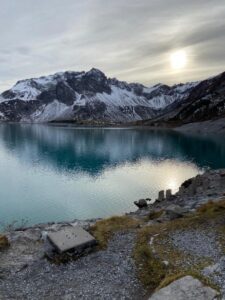
© Phil Brune
Daily life/Going out:
Before I moved to Feldkirch, I was worried that due to the size of the city (approx. 30,000 inhabitants) there would hardly be anything going on at the weekend. This fear was to prove unjustified very quickly. Feldkirch is a very lively and up-and-coming city. The high percentage of young people and the many bars and dance clubs made me feel at home right away.
Every Thursday, Hilti organizes an “Interns Dinner” for 30 interns in different restaurants. This way you meet new people every week and can expand your international network and make new friends. So you have a direct connection when you start new at Hilti.
Due to Feldkirch’s perfect location, in my opinion, there is plenty to do on the weekends, both in summer and winter. Especially if you’re into outdoor activities, you’ll love it. From hiking and biking to skiing and sledding, there is something for everyone. It’s a stone’s throw to Switzerland and Italy isn’t far either. Together with a few interns, we were in Bern, Zurich, Innsbruck, Turin and Milan, for example.
Work at Hilti AG:
Hilti has its headquarters in Liechtenstein. Both the first production facility (Plant 1) and some business units are located there. The working environment is
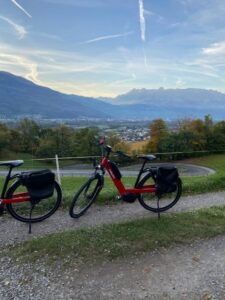
© Phil Brune
very international. I was able to expand my network a lot during the internship. There are about 80 interns working there, all of whom come from all over the world. For example, I was able to improve my English a lot.
Overall, the working atmosphere at Hilti is very pleasant and I can highly recommend the company. And the pay is excellent, by the way.
All in all I can highly recommend to do an internship there.
My internship in Bilbao
- Business Administration and Engineering M.Sc. Mechanical Engineering
- Spain, Bilbao
- FEV Iberia SI
- 10.10.2022-15.01.2023
Preparation:
When it comes to preparing for a stay in Bilbao, the most important thing is housing. In general, finding a place to live in Bilbao is not as stressful as in other cities. The best place to look for housing is “idealista”, a Spanish online real-estate marketplace. Prices obviously differ, but finding adequate housing for around 500 Euro/month is possible. Especially, when you can communicate in Spanish and also stay for at least half a year. Also, there are Erasmus Telegram and Whatsapp groups (you can find them on Instagram or in the Internet) where rooms are offered as well. Besides to look for housing, this is also a great way to make first contacts in the city. Another important preparation would be to look for health insurance. I had the luck that it was organized by the company.
Finding an internship:
In my case, I was a working student in the Aachen Office of the company I then worked for in Bilbao. Generally, going for an international company is the easiest way to find an internship abroad and that’s also how most people I talked to did it. Especially, when you are not fluent in Spanish, a regular local company will be tough to convince to take you.
Culture:
Most people have been to parts of Spain before, so I guess a Culture shock is not to be expected in
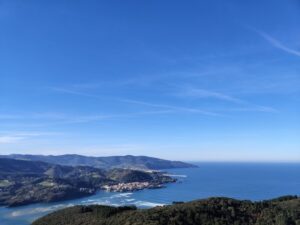
© Lukas Tacke Genannt Unterberg
that case. However, Bilbao is part of the former Basque-county. Even if it is technically Spain, the people are often quite proud of their heritage. Some might take it as an insult, if you call them Spaniards. Additionally, the Basque language is very prominent. You will hear it on the streets and read it a lot on signs. It is very different from Spanish, so don’t be fooled thinking it is just some form of dialect you might be able to understand! All in all I must say, people were very welcoming and most of the time happy to help and communicate, even if there isn’t actually a common language between you. The level of English capabilities is very low in that area, so basics in Spanish or Basque can be very helpful.
Day to day life:
Coming from the culture, food plays a very significant role there. Pintxos (A slice of bread with ANY savory toping you can think of) might be the most prominent one. You can take them for lunch or in the evening with some drinks. Since the city is next to the ocean, fish and other seafoods are integrated in a lot of dishes. If you are a vegetarian or a vegan, it might be hard for you. In more traditional restaurants the vegetarian dish is just a salad or something along that line, so you might want to go to more modern places.
When it comes to going out in the night, Bilbao has a lot to offer. Especially in the casco Viejo (old town) the bar density is very high. But also throughout other parts of the city, you will always find a nice place to grab a beer or a Kalimotxo (popular Basque drink, red wine with cola) and some Pintxos. The club landscape is definitely more restricted. For most clubs, you have to love reggeaton, since it will be played the whole night. But there are also some clubs, where the music choices are more diverse (strong recommend for “Sala Sonora” for Saturdays).
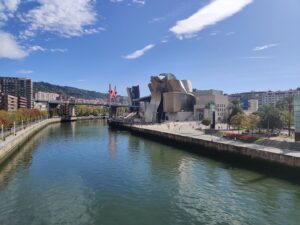
© Lukas Tacke Genannt Unterberg
Public transport is ridiculously cheap and easy in Bilbao. You go to any bigger metro station and buy a “Barik Card”, on which you then can load money. From then on, you just touch-and-go for trains, buses and the metro for prices mostly below 50 cents per ride. The metro also goes all the way to the ocean. Plentzia and Sopella are the beaches reachable by metro I recommend the most. If you want to explore the area, for hikes or to visit other towns nearby, going by bus (Asta or bizkaibus) is a very good option. Most beautiful places I have seen are: San Sebastian, Gangekogorta and the Urdaibai area.
When it comes to work life, in my case it was very similar to my experiences in German companies. Similar working hours, with maybe a longer lunch break and in my case an amazing office climate. My co-workers were always happy to help with tasks or problems at work, but also with recommendations what to do in the area on weekends or which restaurant to go to.
My stay in Vienna – a truly transformative experience
- Business Administration and Engineering: Mechanical Engineering B.Sc.
- Austria, Vienna
- Austrian Institute of Technology
- 09/22 – 12/22
My name is Eva, and I spent September till December 2022 in Vienna doing an internship at a non-university research Institution, in the area of energy technology.
My half year Erasmus experience in Vienna was an incredible journey that completely exceeded my expectations. I arrived in the city in September, feeling a mix of excitement and nervousness. I didn’t know anyone in Vienna, and I was worried about how I would make friends and adjust to living in a new country. But from the moment I arrived, I was pleasantly surprised by how welcoming and friendly everyone was. I really fell in love with the beautiful city of Vienna. To be honest, I was obsessed to do my internship in this city. I have never been there before, but my sister who is currently living in Zurich (I am a bit of a fan of this city as well) told me it is almost as beautiful and a lot cheaper. Spoiler: it is definitely more livable as a student because you can actually afford activities. The cost of living is not as cheap as in Aachen, but still within the range of big cities like Munich or Hamburg.
One of the first things I noticed about Vienna was its stunning architecture. The city is filled with gorgeous buildings and landmarks. I spent many afternoons wandering the streets, taking in the sights and soaking up the rich culture of the city.
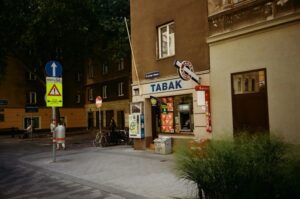
© Eva Paeffgen
In Vienna there are no kiosks, so everywhere are little “Trafiks“ which look really cute. If you want to get a beer in the evening, it is difficult, because supermarkets are closing at 8 pm. But you always can get one at a Würstelstand. My favorite one is the `Wiener Würstelstand´ in Pfeilgasse crossing Strozzigasse. I can recommend the vegan bosna. On the weekend they do organize little events with pretty cool live music.
I was really lucky! In my office I sat only with interns, bachelors students, masters students and PhD students. So it did not take long till we went on for a beer or other activities. My colleagues and I went bouldern. The company were paying half of the price to support sport activities. We also went for paddle, weird sport.
It was also really affordable to do some yoga, in the “oneYoga“ studio it is possible to test all classes for 30 euro for one month after that it costs 90 euro what’s still okay if you go three times a week.
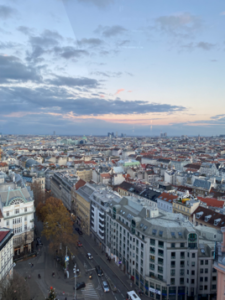
© Eva Paeffgen
I was living in a shared flat with another girl, I found the place on WG-gesucht. It is not easy to find something, but that’s only because no flats are rented with furniture. Everyone else I have met said if you are staying longer, the market really is alright because of social housing. Our flat was in the 8th Bezirk Josefstadt, I would recommend living in the area. It took me 35 minutes to work by train but only a 10 minute walk to get in the city or in the 7th Bezirk which is absolutely my favorite. Full of little restaurants, cute boutiques and nice bars. Maybe a few recommendations: Bars: Espressobar, Cafe Anno, Cafe Benno (they have a lot of games, and you can eat really good kasespätze there). Breakfast: Cafe der Provinz, all you can eat for 18 euro, with a good quality of food, most of them vegetarian and a lot of vegan stuff. Party: there is a website called Vienna wurstelstand -making the most out of Vienna and life. Every month they make recommendations about cool events. My friends and I did a lot of it. Went to art galleries, little concerts or parties. It is also nice to get to know Vienna, so take a look. Restaurants: pizza bussi ciao, mamamon thai or nguyens pho haus.
The picture on the left was taken from the top of the “Haus des Meeres“, you can get up there for free, but it is also possible to have a drink or eat something there. I would go up for the view and get a beer in the area, there are a lot of little cute bars around.
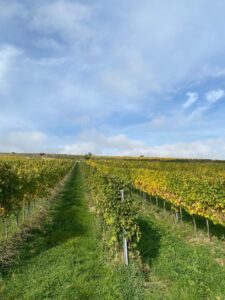
© Eva Paeffgen
If you are also going in winter, you should take a walk on the Kalenberg, it is not far from the city and for me, it was really important sometimes to get some nature and fresh air between all these massive and impressive buildings. There are a lot of Heurigen (vine farmers that are selling between their fields) you can drink „Sturm“ and with good weather you get a beautiful view over the city.
I also had the chance to travel on the weekends. I went to Bratislava which is worth a visit, it is only two hours by train and the city has much to offer. Budapest is a four hour trip, in my opinion you have to stay overnight to make it worthwhile.
Last thing: withdrawing money costs fees, but you can get it for free from the supermarkets.
Overall, my half year Erasmus experience in Vienna was a truly transformative experience. I grew as a person and learned so much about myself and the world around me. I am so grateful for the opportunity to do my internship abroad and to have had the chance to live in such a beautiful and culturally rich city. I will always treasure the memories I made in Vienna and I hope to visit again someday.
My experiences in Sweden – enriching on a professional and personal level
- Construction and Robotics M.Sc.
- Gothenburg, Sweden
- Volvo Group
- March 2022 – December 2022
My decision to seek out an internship abroad was motivated primarily by the opportunity for professional growth. I was motivated to join my host institution- Volvo group in the department of Volvo trucks, for digital and flexible manufacturing plant, for several reasons: Firstly, it is a completely international organization, bringing together diverse collaborations between researchers from all over the world. I was very excited to gain diverse, international, and interdisciplinary perspectives on manufacturing and computer vision as I believed this could offer me a new kind of comprehension of global opportunities. I was also looking forward to building connections with colleagues from my host institute and experiencing first-hand how they approached their work and how their daily working life looked like. Secondly, the fact that the institute was in Gothenburg, Sweden appealed to me as I felt that the new context could offer me unique insights into the research field of Digital productions in real scale industry.
On a personal level, I also believed doing my internship abroad could provide me with the challenge and room for growth offered by new and different surroundings and the opportunity to meet new people. I knew Gothenburg has a beautiful historical center and I was excited to explore the architecture and history of the city. After several months of lockdown due to the Covid-19 pandemic, I found the prospect of new experiences especially energizing and fulfilling.
During my internship I was entrusted with a research project on Computer vison for overhead cameras and AGVs and received the opportunity to work as a researcher with doctorate students and professors from Chalmers University, Gothenburg. Research projects provided me with extremely enriching and fulfilling experiences, in which I learned even more than I could have imagined.
Within the scope of the multiple projects, I explored different methodologies to be able to quantify effectiveness of ARTags- Apriltags, ArucoTags considering light effects, occlusions, speed of detection and tracking. This entailed discussing the advantages and disadvantages of each tags with my team members, critically reviewing and presenting about previous research and learning to practically apply the methods. I worked on strategies for image fusion from multiple cameras and segmentation models as well as computer vision for distributed systems.
Besides cultivating fundamental research competencies, I also developed various soft skills. I cultivated professional and communication skills by interacting with colleagues on a daily basis and working closely together with team members. In doing so, I learned a great amount from my colleagues and their experiences. I both received the opportunity to hold presentations but could also attend lectures given by my colleagues to directly learn from them how to communicate ideas and research findings in an optimized way. I also learned when it was important to ask for help from others and became more confident in taking initiative and contributing my own ideas to the project. By juggling between different tasks and projects, I was able to improve my time management skills and set priorities to become more organized. This also helped me to optimize my work efficiency but also recognize my limits and learn to communicate if I wouldn’t be able to finish a task in the allotted time.
I very much appreciate the large amount of support I received from my host IAESTE and Volvo. I met with my supervisors at least twice a week, sometimes even more frequently and they took a lot of time to guide me and integrate me into the working group as much as possible. My supervisor also often asked me for my opinion and my ideas, which I cannot thank her enough for. Being able to voice my own thoughts and viewpoints proved to be an invaluable opportunity to self-sufficient and independent creative thinking.
Finding accommodation in Gothenburg was most likely one of the most difficult parts of my stay abroad. It was very difficult to find an apartment through online websites from Germany – most of them were in Swedish, many proved to be scams and non-existent and the rest were very expensive. My host institute and IAESTE Gothenburg helped me. My advice would be to start searching for accommodation as early as possible and ask for help from others who are living there.
All of my colleagues at the Volvo trucks are very welcoming and friendly, allowing me to feel completely included and happy during my time there. I gained the opportunity to meet and spend time with many new people. I learned a great amount from them and cherish the memories I have with them. I did get the chance to meet many local people outside of my internship and I was still able to explore a large amount of the city life and surrounding areas with my colleagues, which made me feel more connected to the place I was living in.
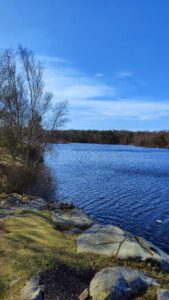
© Gaurav Makwana
In my free time, I would meet with friends from my work and explore the city. I enjoyed going on bike and scooter rides, exploring islands, visiting different historical sites, going to local cafes and restaurants to enjoy FIKA culture, finding the tastiest croissants and travelling to nearby cities or villages. Gothenburg is also close to the sea so I would strongly recommend to head down to all islands and go hiking and swimming there in some of the bluest cold waters you can find. I found the public transport system in Sweden to be very useful for short trips and affordable.
The living costs were in my experience higher in Gothenburg, as compared to Germany. I am therefore very grateful to Erasmus+ for giving me the opportunity to pursue an internship abroad and financially supporting me.
I attended an intercultural seminar and found this to be very helpful to get into a mindset that allows you to make the most out of your time abroad. It also teaches you that any difficulty or hardship that you face in the process can be a valuable learning opportunity. For these reasons, I would recommend it to other students, especially those who have never been abroad before or are looking to gain new insights and perspectives onto their upcoming journey.
My studies and previous research experiences provided me with foundational tools and background knowledge that I could draw from throughout my internship. By being able to apply these skills and competencies, I was able to strengthen and build on to them. This allowed me to cultivate essential research skills and grow confidence in putting them to practice.
Due to the rewarding and fulfilling experience I had during my internship, I feel highly motivated to pursue my studies and to maximize the insights I gain from my courses and professors. The experience also incentivized a future career in Computer vision and Digital manufacturing. Through my internship I realized how important it is to approach a digitalization topic from different angles and perspectives in order to fully understand it and to be able to implement efficient and safety policy measures aiming to mitigate the problems. This taught me how diverse the field can be and how important it is to think creatively and maintain an open mindset for learning from others, regardless of the stage you are in in your career. This reinforced and strengthened my motivation for pursuing a career in global Digitalization strategies.
In summary, while my expectations that I would learn a great amount about the field of Computer vision and develop professionally were fulfilled, my experience abroad also turned out to be very enriching on a personal level – far more than I had anticipated. During my time in Gothenburg, the new people I met, the unique and historical surroundings of the city and the positive and challenging experiences I was confronted with paved the way for growth and self-development. It also made me more open and adaptable to setbacks and helped shift my perspectives to ones in which I could more easily cope with and learn from mistakes.
I believe challenges during an experience abroad are inevitable but that they ultimately prove to be valuable learning opportunities. As eliminating them is not an option: to reduce problems, I believe it is important to plan as much as possible. In my opinion, however, it is more important to anticipate that unexpected outcomes, both good and bad, are bound to come your way and that the way you deal with them will shape your experience.
If you receive the opportunity to do an internship at the firm like Volvo for Research, I would highly recommend to grab the chance. Volvo for Research is a very open-minded and welcoming institution, tailored towards international cooperation. It is a place that fosters growth and openness. I am very thankful that I was able to spend my ten month internship there and would like to express my sincere gratitude to my supervisor and colleagues at the Volvo trucks, as well as to those at RWTH Aachen supporting the Erasmus+ traineeships abroad.
Go abroad. Go to Sweden.
- Business Administration and Engineering: Materials and Process Engineering B.Sc.
- Sweden, Helsingborg
- RKW Sweden AB
- April – October 2022
Ah, what a great summer…looking back now, it feels more like a big vacation than a semester of working. Maybe because I did so many great after- work activities, maybe because my internship itself was nice or maybe because now this time is over and it is winter in Germany. 🙂
I arrived in the middle of April and at first, things started off medium well. My room, rented by the company, was in the basement of a villa with quite a few alcoholics in the building. They were all nice to me, but this was something new and scary to me. Over time and with changing apartment mates it got better, but the first months were a bit hard because I did not feel at home there. Here we already have a few learnings about Sweden; first, almost nobody in Sweden rents apartments, so rental websites are a bit weird and mostly people in unstable points of their lives or students rent apartments. Also, Sweden has super strict laws and crazy prizes when it comes to alcohol, you are for example not allowed to drink alcohol on the street.
Let’s get to a more fun topic, work 😉 For me, working at a Swedish location of a German company was great. The atmosphere was good, the people were really nice and everyone spoke English well. Another great thing about Sweden is, how far it is in all terms of equality. If I was a woman or a man, the site management or the little intern, I felt like everyone was equally important and valuable. This is not the case in all companies or countries and so it was very interesting to have the many times stressed and not so relaxed German part of the company in comparison to the Swedish part I was working at.
If you want to experience a great working atmosphere, try working in Sweden. 🙂
One thing about the chill atmosphere, which almost irritated me, was the amount of Fika (coffee breaks) they take. Sometimes 45 minutes per day made me feel a bit unproductive, but many of my colleagues there were very comfortable with that. Another thing I had heard about before, is the swedes awkwardness when it comes to small talk. My own experience was, that if you have any connection to the person, small talk is fine and they will be really nice. They won’t go out of their way for you, like speak English during the entire lunch because you don’t speak Swedish, but someone will try to integrate you a bit. If they don’t know you at all, they will try not to talk to you at all, in public for example.
I did have a bit of problems in the beginning to get involved socially, but through my hobby sailing, some colleagues and Facebook, things slowly picked up. Facebook is actually one of my biggest recommendations for anyone going to Sweden. If you are trying to rent an apartment, inform yourself on clubs or social groups. If you want to find friends, look there. What works really well is hiking groups. I found that the people there are usually very open, come from everywhere and on top of that you are exploring the area. What happened to me is that one girl saw one of my hiking plans in one group, texted me and we became friends. We even made a trip to Stockholm together in the last weeks of my time in Sweden!
Now let’s come to my specific Skåne recommendations:
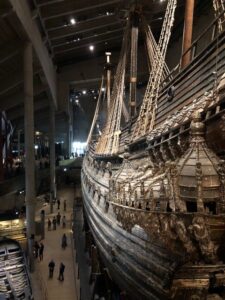
© Kuhlmann, Selma
-Kallbadhusets, beautiful saunas at the sea, where you can switch between bathing in the cold sea and sitting in the sauna. Very relaxing and not very expensive. (about the price for a cup of beer in Sweden;))
-Venn island in the middle of the Öresund, a beautiful place with fun yellow tandem bikes for exploring the nature.
-Kullaberg. An awesome hiking spot northern of Helsingborg.
-The bakery två systras in Helsingbog. They have a lot of awesome traditional Swedish Fikabröd like Kardemummabullar or Vaniljhjärta. My personal cake favorite: the Budapest.
-The Vasa museum in Stockholm. We were also a bit unsure of going because it does cost some money, but it was all worth it. Such an interesting and greatly made museum!
My conclusion: Go abroad. Go to Sweden. Start somewhere new. Learn more about yourself.
Building a metro tunnel under the city of Göteborg
- Business Administration and Engineering: Civil Engineering M.Sc.
- Göteborg, Sweden
- Wayss & Freytag Ingenieurbau AG
- 06.04.2022 – 07.10.2022
1. Application/Finding an internship
During the pandemic and especially the lockdown I decided that I want to do an internship abroad. A fellow student recommended me an internship with Wayss & Freytag Ingenieurbau AG in Göteborg, Sweden. Because I always wanted to explore the Scandinavian region, I knew that would be a great opportunity. After two video calls with the responsible site manager, I got the positive feedback to go there during the summer semester and directly applied for the Erasmus scholarship. For the internship I would recommend applying at least 3 months ahead. It is important that you apply for the Erasmus scholarship at least six weeks before the internship starts. For that scholarship you need to do an EU survey and an OLS language test. The most critical part is the Online Learning Agreement (OLA), where you need signatures from all parties involved.
2. Accommodation & Living expenses
The accommodation was provided by the company. It was a small but very well-equipped apartment in Frihamnen. Even though Frihamnen is on the northern site of the river, I liked the location because the city center is reachable within 10 min bike ride and the public transport is very good. The apartment complex is called ‘waterfront cabins’. They have long- and short-term renting. When visiters came from Germany, they could book them via Airbnb for an affordable price. Otherwise the living expenses are higher than back home. Especially living costs are from what I have heard quite high and for foreigners difficult to get. For renting an accommodation, Sweden is dividing into first and second hand contracts. As a foreigner you can only get second hand contracts, which basically means temporary sublease. The daily expenses are a bit higher, but obviously depends on where you go. For grocery stores I enjoyed going to Lidl. Not only for some German stuff, but also the price/performance is great. From my point of view going out is quite expensive. Clubs usually cost at least 200 SEK (= 20 €) entry fee. Also eating in restaurants or having some drinks in a bar is pricy. As a reference point: 0,4l beer costs in between 45-90 SEK. Again, it really depends on where you go.
3. Everyday life/ the internship
The German company Wayss & Freytag is building a metro tunnel under the city as part of the “West Link” (Västlänken) project in Göteborg. Västlänken is one of the biggest infrastructure projects in Scandinavia. During my internship I was stationed as a project engineer on the construction site in Liseberg. The tunnel line of this site is going to be around 300m long. One of the biggest difficulties is a river going through the construction pit, which makes a lot of heavy foundation works necessary. For that I was mainly supporting the site managers and sometimes the supervisors in the production. I was responsible for the short-term planning as well as different documentary and design tasks. The team I worked with was young and super friendly from the beginning. I got along with them very quickly and we started doing stuff after work and on the weekends immediately. That helped a lot to get along in a new country with a new language. Because the joint venture partner is a Swedish company (NCC), it was roughly 50% Swedish and 50% German speaking coworkers. That made the cultural exchange super interesting. I really enjoyed the work atmosphere with all the colleagues, even though the work attitude/ethic between German and Swedish people may differ. The company also organized afterworks or Friday-breakfasts on a regular basis. One highlight was the summer party. I think those events are helping a lot for team building purposes and gives you a different connection with your coworkers – besides it was very fun. 😉
4. Free time/tips
After work I usually did sports (paddle, running or boulder) with coworkers. During the warm summer months, we sometimes went for a swim in one of the beautiful lakes or the ocean. On the weekends I tried to explore the surroundings of Göteborg. Whether the archipelago near Göteborg or the stunning nature inland, there is so much to discover. Kayaking, hiking or go fishing were only a few activities. Some of my German colleagues started kite surfing or sailing. The opportunities of outdoor activities are just amazing. Göteborg as a city has everything you can imagine. There are clubs and bars, museums, parks and a lot of nice cafes. We often went to the street food market in Lindholmen for a ‘Fika’. If you are looking for a bar with affordable drinks, Tullen’s or Café Magazinete is recommendable. TaKeT is a rooftop bar with an amazing view over the river and one of my favorite places in a sunny afternoon. For weekend excursions, Göteborg is located in a triangle between Oslo, Copenhagen and Stockholm. All three destinations are reachable within 4 hours drive. There is a fast Flixtrain connection to Swedens capital. For Copenhagen and Oslo distance buses are recommended, as they are usually cheaper than train connections. One of the biggest highlights was spending traditional Midsummer in a Swedish summer house. The amount of daylight in the summer was an excellent experience.
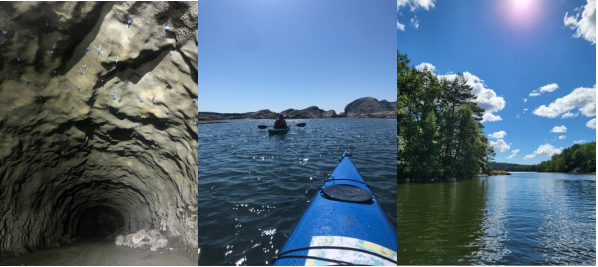
© Johannes Bennewitz
5. Conclusion
In summary, I can say that I absolutely benefited from the internship in many ways. Not only to getting to know the Scandinavian culture and the way of how a big infrastructure project works, but I also made a lot of new friends. For me personally I loved Göteborg as well as the Swedish nature and I will certainly be going there many more times in the future. I can highly recommend the internship program at Wayss & Freytag and I’m proud to be part of the Västlänken project.
My experiences in Bristol
- Electrical Engineering, Information Technology and Computer Engineering (M.Sc.)
- United Kingdom, Bristol
- Infineon Technologies U.K. Ltd.
- March 2022 – August 2022
I lived in Bristol for five months as part of the UNITECH programme. The programme aims to connect engineering students with each other and with companies and to promote the development of soft skills. Part of the programme is a semester abroad at one of the participating universities in Europe and an internship at one of the companies. I decided to do an internship at Infineon Technologies UK Ltd., which at the same time covered the industrial internship I had planned in my Master’s programme.
Through the UNITECH programme, I already had direct contact with Infineon’s HR department, which meant that there was no need for a traditional application process. I wanted to do the internship in a non-German-speaking European country and work on both technical and non-technical tasks. Therefore, a position in the sales area in Bristol was suggested to me, which I accepted after a discussion with my future supervisor.
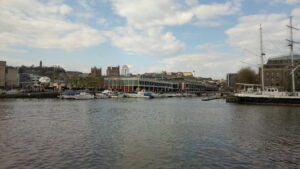
© Maike van den Berg
I was paid like a graduate student for the internship, which in my eyes was a high salary for an intern by German standards, but not necessarily for young professionals. The funding of the internship as an Erasmus+ internship was especially helpful when applying for a visa.
Because of the Brexit, I needed a visa to be able to work in the UK. The process – as mentioned above – was greatly simplified by the Erasmus funding. I applied for a Tier 5 visa with the help of the RWTH. I had to apply for a Certificate of Sponsorship from the British Council, with the RWTH as the sending institution and the company as the receiving/host institution. With this Certificate of Sponsorship, I was then able to apply for the visa online.
I found a room in a shared house in Bristol through SpareRoom, which is similar to WG Gesucht. Living in Bristol is very expensive and I was lucky to find something affordable close to the city centre. Right at the beginning I bought a British prepaid card (ASDA Mobile) so that I could then open a bank account. It was all done online and I went to Lloyds Bank.
My experience in Bristol can be divided very well into professional and private.
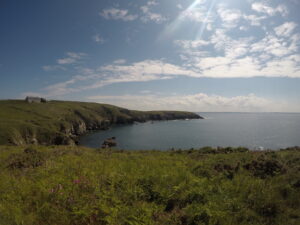
© Maike van den Berg
The internship didn’t really live up to my expectations, partly due to the fact that my supervisor left the company a few weeks after the start of the internship and there was no real replacement, and partly due to the office culture at Infineon in Bristol. Due to the restructuring following the termination of my supervisor, I often lacked a direct contact person and received little feedback on my work despite repeated requests. This was depressing, especially because I had no experience in the sales field and was therefore often somewhat disoriented. However, the internship also included technical projects, which I enjoyed much more and which made me feel more comfortable in the team. In addition, there was little active social life in my office and most of my colleagues were much older than me. Even though I had consistently good experiences in direct contact, no real personal relationships were formed.
These rather disillusioning experiences were more than made up for by everything outside of work! Through my housemates, I had a lot of contact with people my own age locally. Unfortunately, I wasn’t allowed to join any societies at the university because I would have had to be a local student, but I did find a basketball team and made friends through it.
I found Bristol to be a great place to live. It’s a very progressive city with a great arts and culture scene and lots of concerts, some of which are free. There is an almost endless choice of vegan restaurants and many local ciders and beers. The harbour in the city adds to the atmosphere and there are many beautiful parks for warm summer evenings (I was very lucky with the weather during my time there!). Also, the proximity to Wales offers many opportunities for beautiful hikes in the hilly countryside. Unfortunately, the national parks there are not so easy to reach by public transport, so we often rented a car privately via Karshare.
Compared to Germany, the UK is more expensive in all areas. The cost of living was quite high and I found public transport especially expensive.
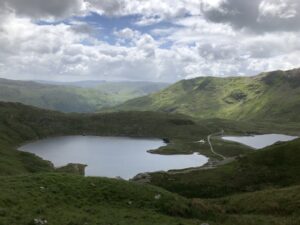
© Maike van den Berg
That’s why I bought a bicycle right at the beginning, which saved me a lot of expensive bus rides.
I am more than happy that I was able to do the internship in Bristol! The internship itself probably helped me the most in that I now know what is important to me in a future job and how I would (not) like to work. At the same time, of course, the insight into a large company was also interesting, as it gave me the opportunity to work with a wide variety of people at Infineon’s different locations.
Everything aside from the internship was what particularly enriched my time in Bristol. I found the British people I met to be incredibly friendly and open and I felt like I was living in a city where many things are possible.
My internship in Norway at Kverneland Energi
- M.Sc. Mechanical Engineering
- Norway, Kvernaland (living in Stavanger)
- Kverneland Energi
- 04.04.2022 – 30.06.2022
On April 1st I arrived in Norway and my first day of work was the 4th of April.
Kverneland Energi is a company that installs PV-systems, plans and installs battery systems and develops the software for projects that either just rely on generators and batteries or additionally use PV panels. My entry in the company started with learning the basic installation process of PV- systems on three different kinds of roofs:
1.flat roofs, which are mostly seen in industry applications
2.steel roofs often used in agriculture; a very interesting sector with wide availability of space for PV- systems and interest in the investment mostly to self-sustain the farmland; and
3. the classic gable roof with tiles, which can either have a hook-system to install the panels ‘on top’ of the tiles or alternatively the pricier option of an embedded PV-system
I worked for the first half of my three months stay in the installing sector of the company and got to know the difficulties and intricacies, which each different kind of project presents. The weather in April in Norway is tough
to predict and I experienced pretty much every time of the season in those 6 weeks –
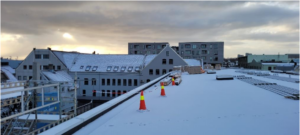
© Adrian Bodamer
starting with snow in week 1 of work and ending with summer like conditions in May, the part that needs most getting used to is the 8-hour work in constant rain. Stavanger is notorious for being city being blessed with rain, but thanks to the golf stream the extreme temperature drops are not too common there and therefor snow is rare. A one-hour drive to Sirdal is not only one of the most impressive road trips I have ever taken, it also completely changes the scenery and climate – presenting itself with at least half a meter of snow in the around easter.
That being said, I got quite lucky, and we mostly worked in sunny weather conditions – with wind presenting the biggest challenge. Carrying and installing the panels in these conditions can be very tricky and presents the engineers with the challenge of providing a system that is able to sustain all kinds of weather challenges on a constant basis.
After 6 weeks outside I joined the software programmers in the office space in Kvernaland, around 30minutes outside of Stavanger. There I worked closely with Andreas, an electrical engineer on a project which runs off grid. The cabins located in ‘Stranddalen’ are about a 1.5h hike away from the next closest village and require an energy system without a grid connection – relying on a generator and sunlight.
With a combination of a large generator, solar panels, and a battery system the cabins can self- sustain for the
3-4 month opening period, starting
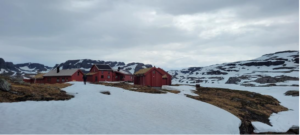
© Adrian Bodamer
in the middle of June. During the winter, the batteries are discharged and must handle temperatures around -10°C over weeks, the panels need to sustain meters of snow pressing down on them. All these extreme weather conditions make this project incredibly exciting!
This project started as the bachelor thesis for Andreas, and my job for most of my time in the office was to program a updated plan to improve the efficiency of when the generator needs to be active, and when the PV-power and battery system can supply the cabins without the use of fuel. Challenging in that was the variation in consume, produced PV current and request of the customer to not run the generator from 9pm to 8am. The battery system is the most important thing to avoid running the generator too often and use unnecessary fuel. Working with data collected over the last 2 years and realising patterns about consume and production, Andreas, Sjur and I implemented the new code created in TIA portal by visiting the cabin and accessing the electric system at the cabins.
Before the visitors and personal come to the cabin, the new system needed to be implemented. A 2-hour hike with increasingly more snow on the path the further we went up the mountain in the middle of June was one of my most surreal
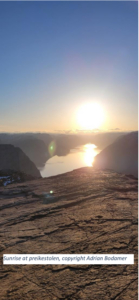
© Adrian Bodamer
experiences and showed me (once again) the stunning beauty of Norway! And the 2-day stay with my two Norwegian co-workers that I had to this point known for only a few weeks was amazing and I always felt very welcome – and that was the case pretty much everywhere I went in Norway.
Without ERASMUS, this trip would have not been possible for me – it was tough to find a place to live for short term rent that was also affordable. Same goes for every day needs like groceries or public transport tickets – everything is more expensive here, without exception. If you plan on having a less stressful time in Norway, then a good approach would definitely be to make a spending plan before arriving. And if you have a car, I would very much advise you to drive it up to Norway if you want to see much of the country as public transport is definitely improvable to say the least. My 17-hour trip from Aachen to Stavanger by car was exhausting but the best decision I made coming up here – though not very sustainable I have to admit. If you ever get the chance to travel to Norway: take it, it’s absolutely worth it!
Wien – eine außerordentlich lebenswerte Stadt
- Wirtschaftsingenieurwesen, FR Maschinenbau
- Wien, Österreich
- Boston Consulting Group
- 12.07.21-17.09.21
Ich wollte nach meinem Bachelor unbedingt noch praktische Erfahrung im Kontext eines Praktikums sammeln. Das Unternehmen, für das ich mich letztlich entschied (Boston Consulting Group) gab mir die Möglichkeit mich zwischen verschiedenen Büros innerhalb Deutschlands, aber auch in Wien, als meinen Praktikums-Standort zu entscheiden. Letztlich ist mir die Entscheidung nicht sehr schwer gefallen. Nach einer durch Covid bedingten recht unaufregende Zeit, wollte ich möglichst neue Erfahrung sammeln und entschied mich daher für das Office, von dem ich mir am meisten Abwechslung versprach – Wien. Soviel vorweg, die Entscheidung habe ich nie bereut! Die Wohnungssuche in Wien ist sehr viel entspannter als man es aus deutschen Großstädten kennt und dazu auch noch bezahlbar – insbesondere im Sommer. ich empfehle dazu die Suche über das Portal WG- Gesucht. Bei mir war es sogar so simpel, dass ich ein Inserat über meine Wohnungssuche einstellen konnte und die WGs mich anschrieben. Ich würde zukünftigen Outgoings empfehlen ein Haus zu suchen, in dem möglichst viele Internationale Studierende leben, da man hier aus meiner Erfahrung am leichtesten Kontakte knüpfen kann. Außer die Anreise musste ich eigentlich nicht viel mehr planen.
Wien ist eine außerordentlich lebenswerte Stadt. Zu meinen Highlights zählen neben der wunderschönen Architektur auch die Naturnähe. So kommt man sehr schnell mit öffentlichen Verkehrsmitteln in die nahegelegenen Weinberge, aber auch zum sommerlichen Planschen an die Donau (Station Donaustadtbrücke). Ganz in der Nähe sind auch Wakeboard-Anlagen, die echt Spaß machen. Super erreichbar von Wien sind auch Bratislava und Budapest für Wochenendtrips. An Nachtclubs kann ich den “Volksgarten” aka “VoGa” ans Herz legen. Allerdings ist der Kleidungsstil eher förmlich und man sollte sich auf lange Wartezeiten einstellen. Unser Workaround war dort sehr früh anzukommen, einen Stempel abzuholen und anschließend noch in eine nahe gelegene Karaoke Bar zu relocaten, ehe die eigentliche Party begann. Richtig stark fand ich auch den Prater, Wiens ganzjähriger Freizeitpark mitten in der Stadt. Als Ingenieur immer eine Reise wert ist das Naturwissenschaftliche Museum Wien, mit Ausstellungen über alle technischen Errungenschaften der Menschheit. Zuletzt gab eine Ausstellung zu Artificial Intelligence. Das naturhistorische Museum fand ich schon weniger spannend, da hier der Fokus eher auf das Ausstellen von möglichst vielen bunten Mineralien gelegt wurde. ich habe gehört, dass das Albertina eine sehr schöne Kunstsammlung zeigt. Ich persönlich war nur im Albertina Modern, das mich persönlich weniger begeistert hat.
Insgesamt hatte ich mit meinem 10 wöchigen Aufenthalt eine recht kurze, aber dennoch intensive Zeit. Durch die finanzielle Unterstützung des Erasmus Programms, kann man dabei auch wirklich viel von der Stadt mitnehmen.


